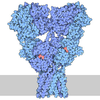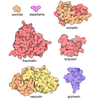+ Open data
Open data
- Basic information
Basic information
| Entry | Database: PDB / ID: 7ldd | ||||||
|---|---|---|---|---|---|---|---|
| Title | native AMPA receptor | ||||||
 Components Components |
| ||||||
 Keywords Keywords | MEMBRANE PROTEIN/IMMUNE SYSTEM / neurotransmitter / two-fold symmetry / hippocampus / ion-channel / MEMBRANE PROTEIN / SIGNALING PROTEIN-IMMUNE SYSTEM complex / MEMBRANE PROTEIN-IMMUNE SYSTEM complex | ||||||
| Function / homology |  Function and homology information Function and homology informationPhase 0 - rapid depolarisation / Phase 2 - plateau phase / Activation of AMPA receptors / Cargo concentration in the ER / COPII-mediated vesicle transport / Synaptic adhesion-like molecules / Trafficking of GluR2-containing AMPA receptors / axonal spine / Unblocking of NMDA receptors, glutamate binding and activation / LGI-ADAM interactions ...Phase 0 - rapid depolarisation / Phase 2 - plateau phase / Activation of AMPA receptors / Cargo concentration in the ER / COPII-mediated vesicle transport / Synaptic adhesion-like molecules / Trafficking of GluR2-containing AMPA receptors / axonal spine / Unblocking of NMDA receptors, glutamate binding and activation / LGI-ADAM interactions / positive regulation of locomotion involved in locomotory behavior / Trafficking of AMPA receptors / positive regulation of membrane potential / localization within membrane / cellular response to ammonium ion / response to sucrose / L-type voltage-gated calcium channel complex / neuron spine / myosin V binding / proximal dendrite / regulation of monoatomic ion transmembrane transport / channel regulator activity / regulation of AMPA receptor activity / response to arsenic-containing substance / cellular response to L-glutamate / cellular response to dsRNA / dendritic spine membrane / long-term synaptic depression / beta-2 adrenergic receptor binding / cellular response to peptide hormone stimulus / neuronal cell body membrane / cellular response to amine stimulus / response to psychosocial stress / peptide hormone receptor binding / response to morphine / spinal cord development / perisynaptic space / protein kinase A binding / AMPA glutamate receptor activity / response to lithium ion / behavioral response to pain / adenylate cyclase binding / AMPA glutamate receptor complex / immunoglobulin binding / response to electrical stimulus / regulation of receptor recycling / ionotropic glutamate receptor complex / G-protein alpha-subunit binding / conditioned place preference / glutamate receptor binding / long-term memory / regulation of postsynaptic membrane neurotransmitter receptor levels / postsynaptic density, intracellular component / neuronal action potential / response to fungicide / vesicle-mediated transport / cellular response to brain-derived neurotrophic factor stimulus / glutamate-gated receptor activity / synapse assembly / somatodendritic compartment / glutamate-gated calcium ion channel activity / presynaptic active zone membrane / dendrite membrane / excitatory synapse / ligand-gated monoatomic ion channel activity involved in regulation of presynaptic membrane potential / synaptic membrane / positive regulation of excitatory postsynaptic potential / dendritic shaft / response to cocaine / PDZ domain binding / calcium channel regulator activity / neuromuscular junction / synaptic transmission, glutamatergic / regulation of membrane potential / transmitter-gated monoatomic ion channel activity involved in regulation of postsynaptic membrane potential / response to nutrient levels / cerebral cortex development / postsynaptic density membrane / receptor internalization / small GTPase binding / Schaffer collateral - CA1 synapse / calcium channel activity / recycling endosome membrane / synaptic vesicle / cell-cell junction / long-term synaptic potentiation / response to estradiol / synaptic vesicle membrane / G-protein beta-subunit binding / amyloid-beta binding / presynapse / cell body / early endosome membrane / scaffold protein binding / dendritic spine / response to ethanol / chemical synaptic transmission / postsynaptic membrane / neuron projection / postsynapse Similarity search - Function | ||||||
| Biological species |  | ||||||
| Method | ELECTRON MICROSCOPY / single particle reconstruction / cryo EM / Resolution: 3.4 Å | ||||||
 Authors Authors | Yu, J. / Rao, P. / Gouaux, E. | ||||||
| Funding support |  United States, 1items United States, 1items
| ||||||
 Citation Citation |  Journal: Nature / Year: 2021 Journal: Nature / Year: 2021Title: Hippocampal AMPA receptor assemblies and mechanism of allosteric inhibition. Authors: Jie Yu / Prashant Rao / Sarah Clark / Jaba Mitra / Taekjip Ha / Eric Gouaux /  Abstract: AMPA-selective glutamate receptors mediate the transduction of signals between the neuronal circuits of the hippocampus. The trafficking, localization, kinetics and pharmacology of AMPA receptors are ...AMPA-selective glutamate receptors mediate the transduction of signals between the neuronal circuits of the hippocampus. The trafficking, localization, kinetics and pharmacology of AMPA receptors are tuned by an ensemble of auxiliary protein subunits, which are integral membrane proteins that associate with the receptor to yield bona fide receptor signalling complexes. Thus far, extensive studies of recombinant AMPA receptor-auxiliary subunit complexes using engineered protein constructs have not been able to faithfully elucidate the molecular architecture of hippocampal AMPA receptor complexes. Here we obtain mouse hippocampal, calcium-impermeable AMPA receptor complexes using immunoaffinity purification and use single-molecule fluorescence and cryo-electron microscopy experiments to elucidate three major AMPA receptor-auxiliary subunit complexes. The GluA1-GluA2, GluA1-GluA2-GluA3 and GluA2-GluA3 receptors are the predominant assemblies, with the auxiliary subunits TARP-γ8 and CNIH2-SynDIG4 non-stochastically positioned at the B'/D' and A'/C' positions, respectively. We further demonstrate how the receptor-TARP-γ8 stoichiometry explains the mechanism of and submaximal inhibition by a clinically relevant, brain-region-specific allosteric inhibitor. #1:  Journal: Science / Year: 2019 Journal: Science / Year: 2019Title: Architecture and subunit arrangement of native AMPA receptors elucidated by cryo-EM. Authors: Yan Zhao / Shanshuang Chen / Adam C Swensen / Wei-Jun Qian / Eric Gouaux /  Abstract: Glutamate-gated AMPA receptors mediate the fast component of excitatory signal transduction at chemical synapses throughout all regions of the mammalian brain. AMPA receptors are tetrameric ...Glutamate-gated AMPA receptors mediate the fast component of excitatory signal transduction at chemical synapses throughout all regions of the mammalian brain. AMPA receptors are tetrameric assemblies composed of four subunits, GluA1-GluA4. Despite decades of study, the subunit composition, subunit arrangement, and molecular structure of native AMPA receptors remain unknown. Here we elucidate the structures of 10 distinct native AMPA receptor complexes by single-particle cryo-electron microscopy (cryo-EM). We find that receptor subunits are arranged nonstochastically, with the GluA2 subunit preferentially occupying the B and D positions of the tetramer and with triheteromeric assemblies comprising a major population of native AMPA receptors. Cryo-EM maps define the structure for S2-M4 linkers between the ligand-binding and transmembrane domains, suggesting how neurotransmitter binding is coupled to ion channel gating. | ||||||
| History |
|
- Structure visualization
Structure visualization
| Movie |
 Movie viewer Movie viewer |
|---|---|
| Structure viewer | Molecule:  Molmil Molmil Jmol/JSmol Jmol/JSmol |
- Downloads & links
Downloads & links
- Download
Download
| PDBx/mmCIF format |  7ldd.cif.gz 7ldd.cif.gz | 839.8 KB | Display |  PDBx/mmCIF format PDBx/mmCIF format |
|---|---|---|---|---|
| PDB format |  pdb7ldd.ent.gz pdb7ldd.ent.gz | 647.5 KB | Display |  PDB format PDB format |
| PDBx/mmJSON format |  7ldd.json.gz 7ldd.json.gz | Tree view |  PDBx/mmJSON format PDBx/mmJSON format | |
| Others |  Other downloads Other downloads |
-Validation report
| Arichive directory |  https://data.pdbj.org/pub/pdb/validation_reports/ld/7ldd https://data.pdbj.org/pub/pdb/validation_reports/ld/7ldd ftp://data.pdbj.org/pub/pdb/validation_reports/ld/7ldd ftp://data.pdbj.org/pub/pdb/validation_reports/ld/7ldd | HTTPS FTP |
|---|
-Related structure data
| Related structure data |  23283MC  7ldeC  7lepC M: map data used to model this data C: citing same article ( |
|---|---|
| Similar structure data |
- Links
Links
- Assembly
Assembly
| Deposited unit | 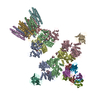
|
|---|---|
| 1 |
|
- Components
Components
-Protein , 4 types, 8 molecules ACBDEFGH
| #1: Protein | Mass: 101678.969 Da / Num. of mol.: 2 / Source method: isolated from a natural source / Source: (natural)  #2: Protein | Mass: 98899.883 Da / Num. of mol.: 2 / Source method: isolated from a natural source / Source: (natural)  #3: Protein | Mass: 18948.420 Da / Num. of mol.: 2 / Source method: isolated from a natural source / Source: (natural)  #4: Protein | Mass: 43502.938 Da / Num. of mol.: 2 / Source method: isolated from a natural source / Source: (natural)  |
|---|
-Antibody , 3 types, 6 molecules ILJMKN
| #5: Antibody | Mass: 27511.527 Da / Num. of mol.: 2 Source method: isolated from a genetically manipulated source Source: (gene. exp.)   #6: Antibody | Mass: 25111.660 Da / Num. of mol.: 2 Source method: isolated from a genetically manipulated source Source: (gene. exp.)  Production host:  Spodoptera aff. frugiperda 1 BOLD-2017 (butterflies/moths) Spodoptera aff. frugiperda 1 BOLD-2017 (butterflies/moths)#7: Antibody | Mass: 27975.439 Da / Num. of mol.: 2 Source method: isolated from a genetically manipulated source Source: (gene. exp.)  Production host:  Spodoptera aff. frugiperda 1 BOLD-2017 (butterflies/moths) Spodoptera aff. frugiperda 1 BOLD-2017 (butterflies/moths) |
|---|
-Sugars , 2 types, 12 molecules 
| #8: Polysaccharide | 2-acetamido-2-deoxy-beta-D-glucopyranose-(1-4)-2-acetamido-2-deoxy-beta-D-glucopyranose #14: Sugar | ChemComp-NAG / |
|---|
-Non-polymers , 9 types, 40 molecules 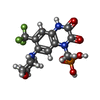
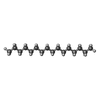
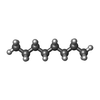
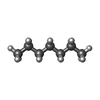
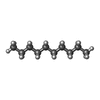
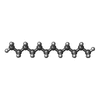
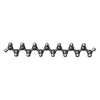
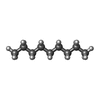
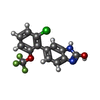








| #9: Chemical | ChemComp-ZK1 / {[ #10: Chemical | #11: Chemical | ChemComp-OCT / #12: Chemical | ChemComp-HP6 / #13: Chemical | ChemComp-D10 / #15: Chemical | ChemComp-D12 / #16: Chemical | ChemComp-C14 / #17: Chemical | ChemComp-DD9 / #18: Chemical | |
|---|
-Details
| Has ligand of interest | Y |
|---|---|
| Has protein modification | Y |
-Experimental details
-Experiment
| Experiment | Method: ELECTRON MICROSCOPY |
|---|---|
| EM experiment | Aggregation state: PARTICLE / 3D reconstruction method: single particle reconstruction |
- Sample preparation
Sample preparation
| Component |
| ||||||||||||||||||||||||||||||
|---|---|---|---|---|---|---|---|---|---|---|---|---|---|---|---|---|---|---|---|---|---|---|---|---|---|---|---|---|---|---|---|
| Source (natural) |
| ||||||||||||||||||||||||||||||
| Source (recombinant) |
| ||||||||||||||||||||||||||||||
| Buffer solution | pH: 8 | ||||||||||||||||||||||||||||||
| Specimen | Embedding applied: NO / Shadowing applied: NO / Staining applied: NO / Vitrification applied: YES | ||||||||||||||||||||||||||||||
| Vitrification | Cryogen name: ETHANE |
- Electron microscopy imaging
Electron microscopy imaging
| Experimental equipment |  Model: Titan Krios / Image courtesy: FEI Company |
|---|---|
| Microscopy | Model: FEI TITAN KRIOS |
| Electron gun | Electron source:  FIELD EMISSION GUN / Accelerating voltage: 300 kV / Illumination mode: FLOOD BEAM FIELD EMISSION GUN / Accelerating voltage: 300 kV / Illumination mode: FLOOD BEAM |
| Electron lens | Mode: BRIGHT FIELD |
| Image recording | Electron dose: 50 e/Å2 / Film or detector model: GATAN K3 (6k x 4k) |
- Processing
Processing
| CTF correction | Type: PHASE FLIPPING AND AMPLITUDE CORRECTION |
|---|---|
| 3D reconstruction | Resolution: 3.4 Å / Resolution method: FSC 0.143 CUT-OFF / Num. of particles: 829000 / Symmetry type: POINT |
 Movie
Movie Controller
Controller











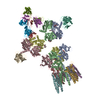


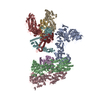


 PDBj
PDBj